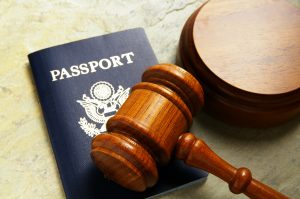Travel Ban 3.0: A No-Go (for now)
October 19, 2017
Two federal judges have blocked President Trump’s third try at implementing a nationwide travel ban.
The first ruling blocking the administration from enforcing the September 24th Presidential Proclamation, which restricts travel into the U.S. by foreign nationals from eight countries, came from the U.S. District Court for the District of Hawaii on Tuesday, October 17, 2017, just hours before the travel ban was scheduled to go into effect. The Hawaii District Court issued a temporary restraining order (“TRO”), basing its decision on the same analysis used by the Ninth Circuit Court of Appeals when it set aside the earlier version of the travel ban – that is, that President Trump exceeded his authority under statutory federal immigration law. As a result of the TRO, nationals from Chad, Iran, Libya, Somalia, Syria and Yemen are exempt from the travel ban, but nationals from North Korea and Venezuela remain subject to the travel restrictions set forth in the Presidential Proclamation.
In his decision, Judge Watson noted that the latest travel ban is being challenged in part because the original travel ban, issued back in January of this year, was an attempt to create a “Muslim Ban”, and President Trump “has never renounced or repudiated his calls for a ban on Muslim immigration.” He wrote that the third iteration of the ban “suffers from precisely the same maladies as its predecessor”, and that it “plainly discriminates based on nationality” in a way that is opposed to federal law.
The second ruling, issuing a preliminary injunction blocking the ban from being enforced, came from the U.S. District Court for the District of Maryland on Wednesday, October 18, 2017. In a narrower decision, Judge Chuang blocked the administration only from enforcing the travel ban against travelers from Iran, Libya, Somalia, Syria, Yemen and Chad with a “bona fide relationship” with people or institutions in the U.S. Judge Chuang found that the Presidential Proclamation violated the First Amendment’s establishment clause since it is aimed at Muslims.
In response to the injunctions, the Justice Department has stated that it plans to appeal the Hawaii District Court’s ruling. We anticipate that the Maryland District Court ruling will also be appealed. In the meantime, the TRO and preliminary injunction are intended to maintain the status quo.
We will continue to apprise clients regarding any developments as they unfold.


 After hearing oral arguments earlier this week from attorneys representing the White House and the states of Washington and Minnesota, last night, the U.S. Court of Appeals for the Ninth Circuit unanimously upheld the U.S. District Court for the Western District of Washington’s February 3, 2017 issuance of a temporary restraining order prohibiting the federal government from enforcing President Trump’s Executive Order 13769, “Protecting the Nation From Foreign Terrorist Entry Into the United States” (EO 13769). As you know from our previous blog posts, EO 13769 suspends the entire refugee admission program for 120 days, the Syrian refugee program indefinitely and the entry of immigrants and non-immigrants from Iran, Iraq, Libya, Somalia, Sudan, Syria and Yemen for an initial 90-day period. For now, as a result of the Ninth Circuit’s decision, citizens from the seven restricted countries will be able to travel to the U.S. Despite the fact that the Ninth Circuit’s ruling refuses to reinstate EO 13769’s travel ban, it is important to note that this situation will continue to be fluid, and the Trump administration will very likely seek to appeal this latest decision. As such, we continue to advise that individuals from the seven restricted countries who are presently in the U.S. forego unnecessary international travel at this time. In addition, for those individuals from the restricted countries who have valid U.S. visas, who are presently outside the U.S. and who have the intent to return to the U.S., we recommend that they consider traveling to the U.S. while there remains an opportunity to do so.
After hearing oral arguments earlier this week from attorneys representing the White House and the states of Washington and Minnesota, last night, the U.S. Court of Appeals for the Ninth Circuit unanimously upheld the U.S. District Court for the Western District of Washington’s February 3, 2017 issuance of a temporary restraining order prohibiting the federal government from enforcing President Trump’s Executive Order 13769, “Protecting the Nation From Foreign Terrorist Entry Into the United States” (EO 13769). As you know from our previous blog posts, EO 13769 suspends the entire refugee admission program for 120 days, the Syrian refugee program indefinitely and the entry of immigrants and non-immigrants from Iran, Iraq, Libya, Somalia, Sudan, Syria and Yemen for an initial 90-day period. For now, as a result of the Ninth Circuit’s decision, citizens from the seven restricted countries will be able to travel to the U.S. Despite the fact that the Ninth Circuit’s ruling refuses to reinstate EO 13769’s travel ban, it is important to note that this situation will continue to be fluid, and the Trump administration will very likely seek to appeal this latest decision. As such, we continue to advise that individuals from the seven restricted countries who are presently in the U.S. forego unnecessary international travel at this time. In addition, for those individuals from the restricted countries who have valid U.S. visas, who are presently outside the U.S. and who have the intent to return to the U.S., we recommend that they consider traveling to the U.S. while there remains an opportunity to do so.